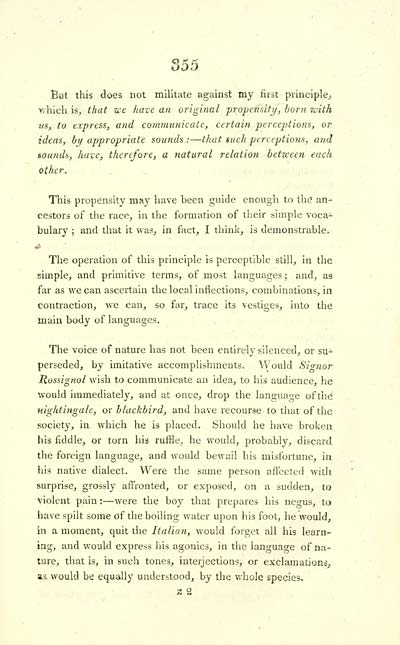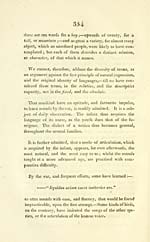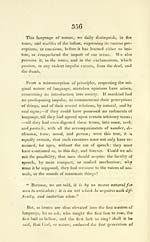Blair Collection > Celtic researches, on the origin, traditions & language, of the ancient Britons
(449)
Download files
Complete book:
Individual page:
Thumbnail gallery: Grid view | List view

355
But this does not militate against my first principle^
■*vhich is, that we have an original propensity, born with
■us, to express, and cominunicate, certain perceptions, or
ideas, by appropriate sounds: — that such perceptions, and
sounds, have, therefore, a natural relation betzveen each
other.
This propensity may have been guide enough to thd an-
cestors of the race, in the formation of their simple voca-
bulary ; and that it was, in fact, I think, is demonstrable.
The operation of this principle is perceptible still, in the
simple, and primitive terms^ of most languages ; and, as
far as we can ascertain the local inflections, combinations, in
conti'action, we can, so far, trace its vestiges^ into the
inain body of languages.
The voice of nature has not been entirely silenced, or su-
perseded, by imitative accomplishments. Would Sia-yior
Rossignol wish to communicate an idea, to his audience, he
would immediately, and at once, drop the language of the
nightingale, or blackbird, and have recourse to that of the
society, in which he is placed. Should he have broken
his fiddle, or torn his ruflfle, he would, probably, discard
the foreign language, and would bewail his misfortune, in
his native dialect. Were the same person aftected with
surprise, grossly affronted, or exposed, on a sudden, to
violent pain : — were the boy that prepares his negus, to
have spilt some of the boiling water upon his foot, he would,
in a moment, quit the Italian, Avould forget all his learn-
ing, and would express his agonies, in the language of na-
ture, that is, in such tones, interjections, or exclamations,
as would be equally understood, by the whole species,
ζ 2
But this does not militate against my first principle^
■*vhich is, that we have an original propensity, born with
■us, to express, and cominunicate, certain perceptions, or
ideas, by appropriate sounds: — that such perceptions, and
sounds, have, therefore, a natural relation betzveen each
other.
This propensity may have been guide enough to thd an-
cestors of the race, in the formation of their simple voca-
bulary ; and that it was, in fact, I think, is demonstrable.
The operation of this principle is perceptible still, in the
simple, and primitive terms^ of most languages ; and, as
far as we can ascertain the local inflections, combinations, in
conti'action, we can, so far, trace its vestiges^ into the
inain body of languages.
The voice of nature has not been entirely silenced, or su-
perseded, by imitative accomplishments. Would Sia-yior
Rossignol wish to communicate an idea, to his audience, he
would immediately, and at once, drop the language of the
nightingale, or blackbird, and have recourse to that of the
society, in which he is placed. Should he have broken
his fiddle, or torn his ruflfle, he would, probably, discard
the foreign language, and would bewail his misfortune, in
his native dialect. Were the same person aftected with
surprise, grossly affronted, or exposed, on a sudden, to
violent pain : — were the boy that prepares his negus, to
have spilt some of the boiling water upon his foot, he would,
in a moment, quit the Italian, Avould forget all his learn-
ing, and would express his agonies, in the language of na-
ture, that is, in such tones, interjections, or exclamations,
as would be equally understood, by the whole species,
ζ 2
Set display mode to: Large image | Transcription
Images and transcriptions on this page, including medium image downloads, may be used under the Creative Commons Attribution 4.0 International Licence unless otherwise stated. ![]()
| Early Gaelic Book Collections > Blair Collection > Celtic researches, on the origin, traditions & language, of the ancient Britons > (449) |
|---|
| Permanent URL | https://digital.nls.uk/75768834 |
|---|
| Description | A selection of books from a collection of more than 500 titles, mostly on religious and literary topics. Also includes some material dealing with other Celtic languages and societies. Collection created towards the end of the 19th century by Lady Evelyn Stewart Murray. |
|---|
| Description | Selected items from five 'Special and Named Printed Collections'. Includes books in Gaelic and other Celtic languages, works about the Gaels, their languages, literature, culture and history. |
|---|

